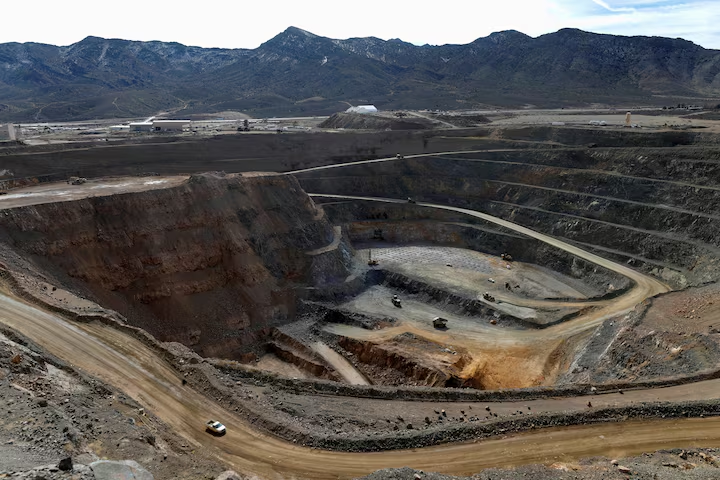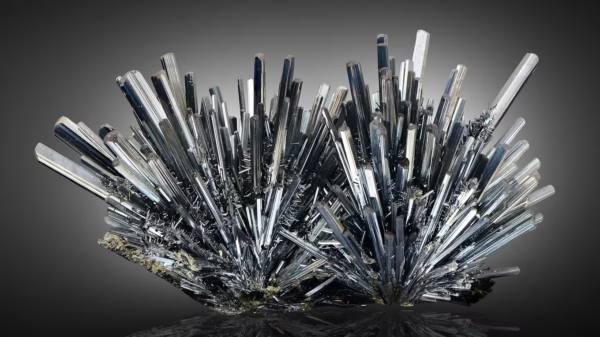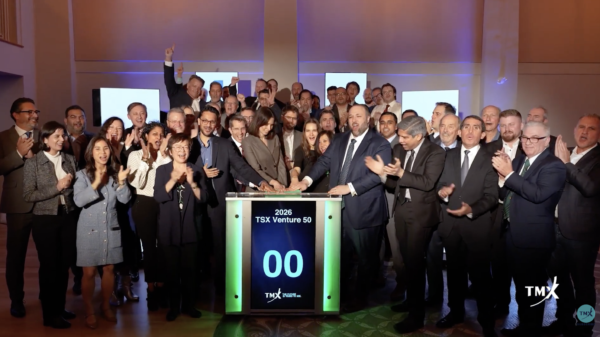MP Materials Corp (NYSE: MP) has launched a major joint venture with Saudi Arabian Mining Co., Ma’aden, to build a rare-earth processing and magnet manufacturing hub in Saudi Arabia.
Announced on Wednesday, the move places the United States’ largest rare-earth producer inside one of the world’s most aggressive critical-minerals investment programs and deepens its footing in a region seeking a larger global role.
Investors quickly noted that the partnership could anchor a non-Chinese supply-chain route at a time when Western markets remain tight.
The companies will create an integrated refinery and separation plant in the kingdom. The complex will take Saudi and allied feedstocks through several stages of processing and refinement. It will then convert those materials into finished rare-earth oxides and magnet-ready products. MP will supply its separation expertise, while Ma’aden will lead domestic resource development. The structure gives the Saudi partner control of upstream growth while giving MP a major downstream base in the Gulf.
The facility will use Saudi Arabia’s low-cost energy, modern infrastructure and strategic location. It will also draw on the country’s largely untapped rare-earth resources. The companies intend to ensure a stable and secure supply of feedstock and refined products for industry and defense customers in the United States, Saudi Arabia and allied markets. Additionally, the project is designed to process feedstock from Saudi Arabia and other regions, offering flexibility as global supply patterns shift.
MP Materials said the refinery will produce substantial volumes of separated light and heavy rare-earth oxides. The refined materials will support manufacturers that rely on neodymium, praseodymium, terbium and dysprosium, elements vital to advanced magnets.
Read more: NevGold closes its Nutmeg Mountain acquisition with Goldmining for $3 million
Read more: NevGold’s latest Nevada drill results show exceptional gold mineralization
Mountain Pass remains America’s only rare-earth-mine
These magnets power electric vehicles, wind turbines, precision defense systems and dozens of commercial technologies. The companies also plan to market the refined oxides to trusted international buyers.
The joint venture drew immediate attention because it expands MP’s downstream footprint beyond its long-standing Mountain Pass operations in California. Mountain Pass remains America’s only active rare-earth mine and separation facility. However, the company has faced pressure to increase output and diversify supply lines. The Saudi project could provide that relief. Furthermore, the initiative arrives as governments seek to reduce reliance on China, which currently dominates refining and magnet production.
MP has moved deeper into U.S. strategic planning over the past several years. The company previously reached an agreement with the U.S. Department of Defense to revive domestic magnet manufacturing and heavy-rare-earth separation. It also secured support to expand its U.S. refining base. Consequently, Washington has treated MP as a central player in its effort to rebuild non-Chinese capacity from mine to magnet.
In its latest announcement, MP disclosed that the U.S. government will again take a direct role. The joint venture is structured to give MP and the U.S. Department of War a combined 49 per cent stake, while Ma’aden will hold at least 51 per cent. The U.S. partner will also supply full non-recourse financing for its share, allowing MP to avoid new debt obligations tied to the venture. The company will contribute its rare-earth separation technology, global sourcing network and established commercial relationships.
Read more: NevGold delivers major growth at Idaho gold project
Read more: Antimony recovery results from NevGold’s Limo Butte project exceed expectations
Kingdom aims to become top-tier critical minerals supplier
James Litinsky, MP’s founder, chairman and CEO, described the partnership as a strategic alignment of American, Saudi and industry interests. He said the U.S. government asked the firm to take on a project with far-reaching significance. He also said MP’s integrated model could extend U.S. industrial capabilities overseas. His remarks signaled that Washington sees the venture as an extension of its domestic reshoring strategy, but one carried out through a trusted operator abroad.
Saudi Arabia has pushed aggressively into mining as part of its economic diversification agenda. The kingdom wants to become a top-tier supplier of critical minerals, and officials have outlined plans for global partnerships across exploration, refining and manufacturing. The MP–Ma’aden project fits that ambition. It also complements the country’s goal to become a manufacturing hub that can feed regional and international industries. Additionally, the effort strengthens ties with the United States as competition for minerals intensifies.
Under the agreement, MP and Ma’aden will unlock upstream resources from multiple regions. They aim to expand MP’s refining capacity and increase the company’s ability to produce high-purity oxides at scale. The project’s Gulf location offers closer access to shipping lanes that serve Europe, Asia and Africa. It also allows both companies to serve emerging markets where demand for electric vehicles and renewable-energy infrastructure is rising quickly.
The companies said the venture will operate with U.S. oversight and in alignment with national-security objectives. Heavy-rare-earth separation and magnet-related activities carry significant strategic weight.
Read more: GoldMining chooses to retain its NevGold shares for next 18 months
Read more: NevGold Expands Gold-Antimony Potential at Limousine Butte in Nevada
The joint venture follows partnership with Department of War
These materials support classified systems, advanced sensors, missile-guidance components and other defense technologies. MP already supplies some of these materials to U.S. contractors. The new venture could expand that capacity. However, the company stresses that commercial buyers remain a priority, since demand for electric motors continues to surge.
MP is also evaluating opportunities to collaborate on magnet manufacturing in Saudi Arabia. The company wants to expand beyond oxide production and convert more of its materials into finished magnets.
Magnets deliver the highest value in the rare-earth supply chain. They also offer more stable margins than upstream mining. In addition, magnets are essential to most large-scale electrification programs, which governments and automakers are accelerating.
The joint venture follows MP’s announcement of a multibillion-dollar public-private partnership with the Department of War in July 2025. That agreement supports heavy-rare-earth separation in California and expands U.S. magnet production.
MP is investing more than $1 billion and hiring more than 1,000 manufacturing workers to carry out the plan. The company is also building a second magnet plant in the United States to meet growing demand from electric-vehicle and industrial customers.
MP will expand heavy-rare-earth separation at Mountain Pass as part of the broader program. This move will help the United States build a complete rare-earth supply chain. Additionally, the company will ramp up its refining capabilities to supply both domestic and allied magnet facilities.
Industry analysts say the combination of U.S. and Saudi expansion could make MP one of the few non-Chinese operators with scalable production across multiple continents.
Read more: NevGold edges closer to gold-antimony resource with latest Limousine Butte results
Read more: NevGold targets U.S. critical mineral supply chain with new antimony-gold find
Multiple companies looking to help rebuild supply chain
The United States has advanced several initiatives to rebuild a full rare-earth and critical-minerals supply chain. It has expanded public-private partnerships that support domestic separation, refining and magnet manufacturing, including major federal backing for companies positioned to supply defense and commercial markets.
Washington has also deployed financing tools through agencies that lower risk for processors and downstream manufacturers. To accelerate development, the federal FAST-41 permitting framework has been used to shorten review timelines for qualifying mining and processing projects.
Policymakers have broadened the list of minerals defined as “critical,” adding materials such as lithium and antimony to ensure they receive prioritised permitting attention, federal funding eligibility and strategic-stockpile relevance.
Additional programs at DOE, USGS and the Department of Defense now target research, exploration support and direct investment to strengthen each stage of the supply chain.
Companies seeking federal support have responded by demonstrating strategic value alongside traditional economic potential. NevGold Corp (CVE: NAU) (OTCMKTS: NAUFF) (FRA: 5E50) has positioned itself as both a gold developer and an emerging antimony supplier. The company has released metallurgical results showing strong antimony recoveries and emphasized this capability in its technical disclosures and investor materials.
It has also raised new capital to advance drilling and processing studies, strengthening its case for government interest. By showcasing how their deposits can contribute to supply-chain resilience, junior miners aim to align with federal priorities and secure potential funding, partnerships or future offtake agreements tied to the United States’ broader push to diversify and secure critical-minerals production.
.
NevGold Corp is a sponsor of Mugglehead news coverage
.














